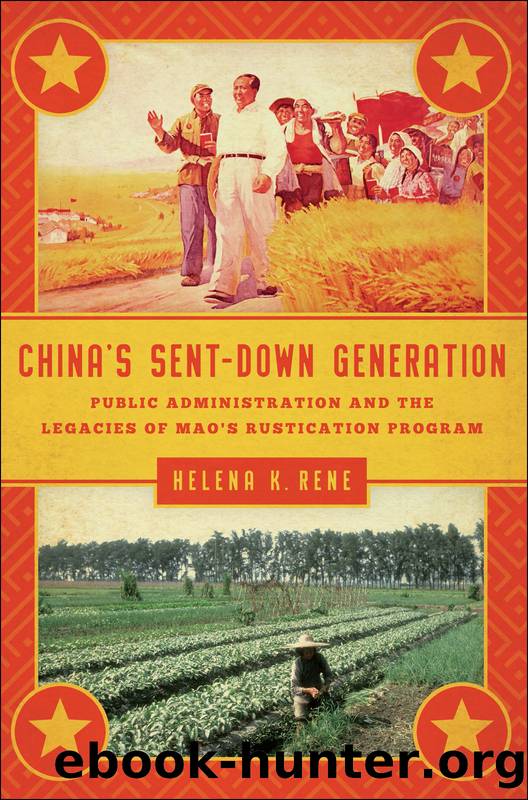China's Sent-Down Generation: Public Administration and the Legacies of Mao's Rustication Program by Helena K. Rene

Author:Helena K. Rene [Rene, Helena K.]
Language: eng
Format: epub
Tags: International Relations, General, Political Science, Public Affairs & Administration
ISBN: 9781589019874
Google: ugFBABXpNLQC
Goodreads: 16276976
Publisher: Georgetown University Press
Published: 2013-03-01T00:00:00+00:00
Tao Fan, a businessman, emphasized the role of administrative communication in organizing, coordinating, and implementing the rustication program:
At that time, when the central government wanted to issue a new order or announce a new directive, it didnât just go to the specific department concerned, instead, the document was sent to all the governmental offices. For example, any central documents that had to do with the decisions of the sent-down policy, all those documents were issued by the CCP Central Committee, the State Council, the Central Military Commission of the CCP, and the Central Cultural Revolution Committee. These four units jointly issued the documents together, and thatâs where all those red-letterhead, official documents (directives) came from. The receiving units were the various military regions, various branches of the military, the revolution committees of various provinces and autonomous regions across the country, and the revolution committees of the various departments, agencies, and organizations of the national government. ⦠So they didnât just send these documents to the Knowledgeable Youth Resettlement Offices alone, but instead they sent the documents to all the party and governmental administrative organizations, and the directive was passed through the hierarchies of the party structure. From the provincial government, a specific order gets conveyed downward to ⦠the county levels. The military conveys the documents to the regional-level government whereas the local government conveys the orders to the county-level government, then maybe through a telephone call, the county-level government conveys the order to the commune-level headquarters, then from there to the brigades. ⦠It was through this national administrative machine, the whole system of bureaucracies under the CCP public administrative machine, that the sent-down policy was put in effect, carried out, and implemented from the very top straight down to the very bottom. (I9, 42â43)
Jia Li noted that âthe whole process of being sent-down was ⦠like recruitment for laborâ (I25, 18). Kang Lin viewed rustication from a similar perspective:
From the bottom up, every village can report to a higher body at the top what their conditions were, what they have or what they want. For example, a village may ask for a specific gender, they may want more men or women for this or that reason. They may want expert knowledge in specific subjects because they lack teachers in those subject areas at their local schools. They may only have two empty houses so they can absorb only however many sent-downs, so they tell the top what they have and what they want. (I28, 7)
Lin also noted that, by contrast, rustication at military farms was centralized and top down:
To organize zhiqing to be sent down to military farms, thatâs even smoother and easier for the central government to do because all the military farms were managed under military organization from teams to platoons, battalions, companies, divisions, et cetera. The army administration was highly organized and orderly so when the central government gave them a task of arranging for a number of urban youth to be sent down and resettled, it was done in the military fashion, with order and discipline.
Download
This site does not store any files on its server. We only index and link to content provided by other sites. Please contact the content providers to delete copyright contents if any and email us, we'll remove relevant links or contents immediately.
Spell It Out by David Crystal(35861)
Life for Me Ain't Been No Crystal Stair by Susan Sheehan(35550)
Cecilia; Or, Memoirs of an Heiress — Volume 1 by Fanny Burney(32095)
Cecilia; Or, Memoirs of an Heiress — Volume 3 by Fanny Burney(31482)
Cecilia; Or, Memoirs of an Heiress — Volume 2 by Fanny Burney(31436)
The Great Music City by Andrea Baker(30932)
Professional Troublemaker by Luvvie Ajayi Jones(29445)
We're Going to Need More Wine by Gabrielle Union(18664)
Twilight of the Idols With the Antichrist and Ecce Homo by Friedrich Nietzsche(18324)
The Secret History by Donna Tartt(18269)
All the Missing Girls by Megan Miranda(14860)
Cat's cradle by Kurt Vonnegut(14806)
Pimp by Iceberg Slim(13828)
Bombshells: Glamour Girls of a Lifetime by Sullivan Steve(13718)
Fifty Shades Freed by E L James(12937)
Talking to Strangers by Malcolm Gladwell(12916)
Norse Mythology by Gaiman Neil(12880)
The Social Justice Warrior Handbook by Lisa De Pasquale(11970)
Underground: A Human History of the Worlds Beneath Our Feet by Will Hunt(11857)
